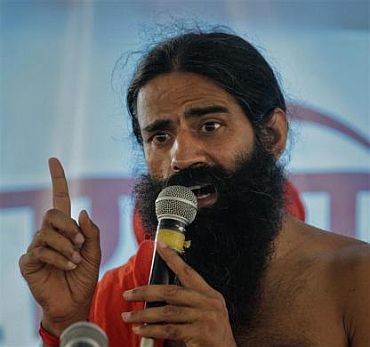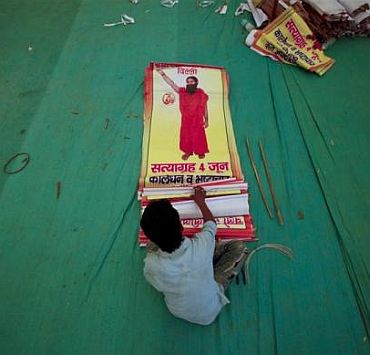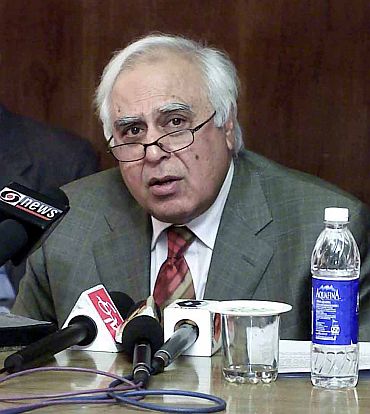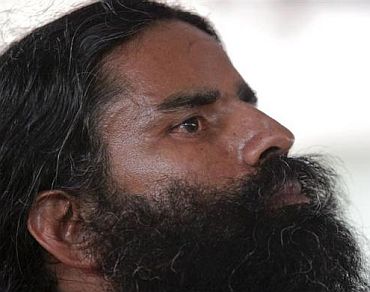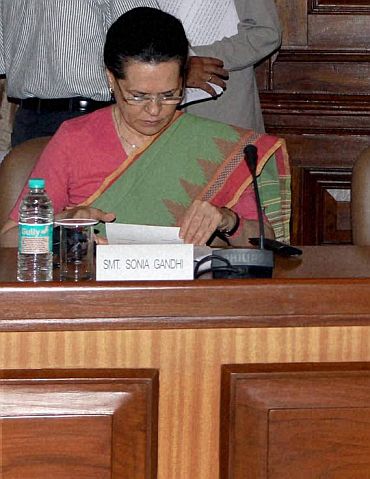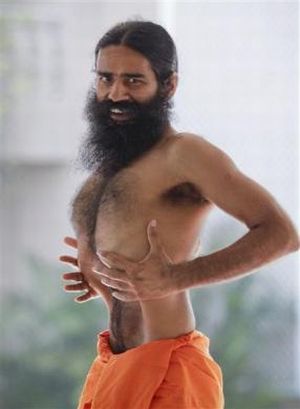 | « Back to article | Print this article |
Revealed: Why Centre changed its Ramdev stance
Neerja Chowdhury explains why the government was soft where it could have been tough. And tough where it could have demonstrated more patience
At the Congress' core group meeting last week, Congress president Sonia Gandhi is believed to have asked Finance Minister Pranab Mukherjee why he went to the airport to receive yoga guru Baba Ramdev.
She could understand others going but not Pranab.
The finance minister reportedly replied that Prime Minister Manmohan Singh had asked him to go and that this was the decision of the Cabinet Committee on Political Affairs.
This conversation took place in the presence of the prime minister, and there was speculation afterwards whether her query was a way of expressing her unhappiness with Dr Singh on the way the Ramdev affair had been managed.
Please click on NEXT to read further...
Revealed: Why Centre changed its Ramdev stance
The government made an 180 degree turn in three days, between June 1, when a battery of senior ministers rushed to receive Baba Ramdev at the Delhi airport, and June 4, when the government decided to resort to the extreme step of a police crackdown against him and his unarmed followers in the dead of night, releasing tear gas in an enclosed space.
Swinging from one extreme to the other, the government could not make up its mind whether it should adopt a tough line or a conciliatory one to deal with the situation. It could have acted tough when Ramdev arrived in Delhi and externed him from the airport itself.
At that time it would not have invited the kind of flak, which has come its way following the Saturday night action. There was anyway a red alert in Delhi and other metros after the killing of Osama bin Laden in Pakistan, and that would have been reason enough to keep large crowds out of the capital.
Revealed: Why Centre changed its Ramdev stance
Ramdev had been announcing from the housetops that at least one lakh of his followers would converge in Delhi to sit on a fast with him.
That would have been enough to send him packing, as he had been given permission to use the Ramlila Grounds for a yoga shivir meant only for 5000 people, and not for a fast, or for larger crowds.
Instead, the government opted for a dialogue with Baba. It bent over backwards to accomodate him, taking a battery of four senior leaders to receive him at the airport, including the number two in government to personally explain to a yoga guru what he was doing to curb black money -- Parliamentary Affairs Minister Pawan Bansal as a translator, Subodh Kant Sahay, with his proximity to Ramdev, specially summoned back from Europe, to receive Baba and Kapil Sibal was of course the chief negotiator.
That was not all.
Revealed: Why Centre changed its Ramdev stance
It was felt that the cabinet secretary should also go. The cabinet secretary felt that since he was retiring month end, the person designated as cabinet secretary, Ajit Seth, should also accompany the group.
He felt that it would be useful to include the secretary personnel and senior intelligence officers, all of whom were also present. Earlier, the Central Board of Direct Taxes chairman had been despatched to Baba to brief him personally.
Small wonder then that the country saw it as a sign of a panicky government prostrating before Ramdev, desperate to dissuade him from going ahead with his action against black money.
The only explanation for the way the government put itself out before Ramdev, was that it saw in his proposed fast an opportunity to divide the civil society and bring down Anna Hazare a peg or two, by building up Ramdev in a limited sort of way.
Revealed: Why Centre changed its Ramdev stance
Team Anna had threatened to walk out of the Joint Drafting Committee if the prime minister and the Chief Justice of India were not brought within the ambit of the Lok Pal Bill, adding to the discomfort of the government nominees.
In any case, Baba's demands about curbing black money were more general -- many of them vague -- in nature, unlike Anna's insistence on giving a sharp focus to the Lok Pal Bill. But this strategy proved to be counterproductive.
Having gone ahead with the 'soft' line, the government did not see it through to its logical end. Having wrested a written commitment from Ramdev that he would announce the end of his fast by 4 pm, could the government not have shown a little more patience in a rapidly developing situation, instead of immediately making public the agreement, which could have been done even a day later?
That is the question many are asking today.
Revealed: Why Centre changed its Ramdev stance
It is possible that Baba was stringing along the negotiators, and that there was pressure on him by the RSS not to agree to what the government proposed. At the same time, it was also known that the RSS-BJP were getting fed up with him for getting 'coopted' by the government.
KN Govindacharya, who has been a bridge between Ramdev and the RSS, had expressed his disgust with him publicly. It is possible that Baba invited Sadhvi Ritambara to be on the dais with him as a way of reassuring the Sangh Parivar.
Surprisingly, Kapil Sibal made public the signed agreement, penned on behalf of Ramdev by his aide Acharya Balkrishna, minutes after Ramdev had told his supporters that the government had agreed to 99 per cent of his demands and very soon they could go home.
But minutes after the agreement had been made public -- which exposed the yoga guru of having cut a deal -- the fat was in the fire and it was back to the battle.
Revealed: Why Centre changed its Ramdev stance
None of these factors need have prompted the government to go in for the midnight crackdown, something it will take a long time to live down.
If there was a security risk -- now there are wild theories going around about bloodshed being on the cards -- the Union of India had a myriad ways of handling it, including stopping people coming into Delhi, than resorting to a midnight swoop, which injured many including women.
Many believe that having invited so much flak for their earlier capitulation, the negotiators were under tremendous pressure to show 'success', by getting Ramdev to end the fast.
When that did not seem to be happening, there was pressure from the hardliners in government, and in the party, to display a 'toughness' to counter the image of weakness displayed earlier.
Revealed: Why Centre changed its Ramdev stance
The party had expressed its displeasure with the airport botchup. It is inconceivable that Sonia would not have been consulted about the Saturday night action -- and Kapil Sibal has said repeatedly that all who mattered were in the know -- clearly she was not happy with the way it panned out.
She cut short Sibal at a stock-taking party meet when he wanted to outline the chronology of events by way of an explanation. She interjected by saying that she did not want to hear it.
The government moving in one direction and the party distancing itself from its actions was not a dual track strategy in evidence. It was each one on his own track.
The day the high-level government delegation went to receive Ramdev at the airport, or held five and half hours of negotiations with him at the Claridges Hotel, senior AICC general secretary Digvijay Singh was lampooning him.
Revealed: Why Centre changed its Ramdev stance
Pranab had reportedly written a letter to Ramdev earlier praising his commitment to the culture and the country. Digvijay Singh called him a thug and a cheat.
Today, the entire party has adopted the Digvijay line. Making a virtue of a necessity, the Congress is going on the offensive against the RSS -- even calling Hazare a RSS 'mukhota' -- to consolidate its vote bank, obviously with an eye on the forthcoming UP elections.
The Ramdev operation showed the lack of a clear command in the government today, though there are several experienced leaders and power centres. It also showed a communication gap between the government and the party.
That is probably why the government was soft where it could have been tough. And tough where it could have demonstrated more patience. In the process, it fell between two stools.

